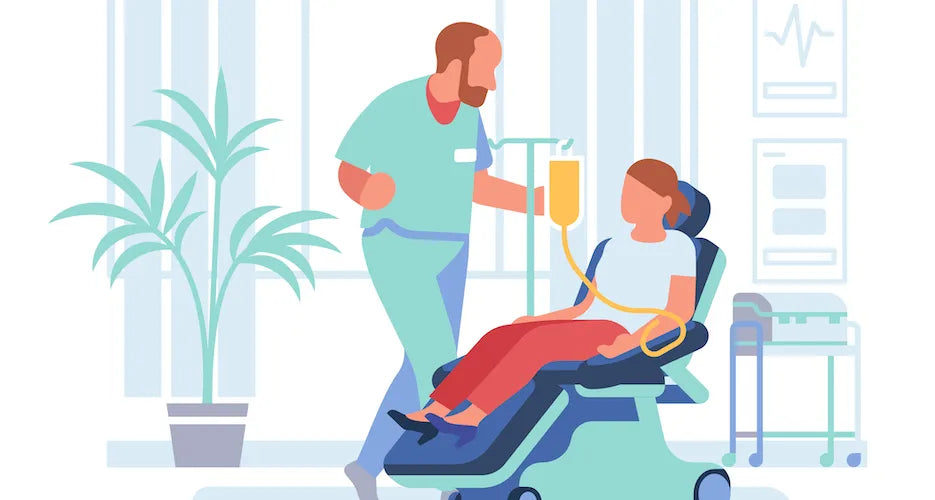
How to Stop Chemotherapy Heartburn and Acid Reflux
|
|
Time to read 4 min
|
|
Time to read 4 min
Chemotherapy is known to cause acid reflux and heartburn in up to 50% of people undergoing cancer treatment. If you’re undergoing chemotherapy treatment and experiencing burning discomfort in your chest or throat, this guide explains why it happens and how to manage it safely and effectively.
Disclaimer: The information provided in this blog post is for general knowledge and informational purposes only, and does not constitute medical advice. Always consult with a qualified healthcare professional before making any decisions about your health or treatment. If you experience persistent or severe acid reflux, seek medical attention immediately.
Heartburn is a symptom of acid reflux. Acid reflux occurs when stomach acids leak through a muscular valve called the lower esophageal sphincter (LES) that separates the stomach from the esophagus.
Heartburn and acid reflux are common side effects of chemotherapy. These symptoms are typically caused by a combination of medication-related irritation, slowed gastrointestinal function, and weakened esophageal barriers.
Some chemotherapy drugs can disrupt the nerves and muscles controlling the LES, the valve that keeps stomach acid in place. When the LES becomes weaker, acid more easily flows back (refluxes) into the esophagus, especially after meals or when lying flat. Platinum-based agents (like cisplatin) and anthracyclines (like doxorubicin) are particularly known for this effect.
Chemotherapy, especially with drugs like vincristine, cisplatin, or taxanes, can slow down stomach movements by affecting gut nerves and muscles. This means food and liquids stay in the stomach longer, giving acid more opportunity to travel backwards and cause heartburn. Reduced physical activity during treatment can further contribute to this problem.
Chemotherapy drugs non-specifically target and destroy fast-replicating cells, which not only include cancer cells but also cells of the digestive tract, bone marrow, skin, and hair.
When the digestive tract is targeted, the esophagus can become severely inflamed, a condition referred to as esophagitis. Some chemotherapy drugs, including 5-fluorouracil (5-FU) and methotrexate, can cause esophagitis. A damaged or inflamed esophagus can alter the position of LES, increasing the risk of acid reflux. If symptoms are severe, seek medical attention promptly.
Although acid reflux is common during chemotherapy, several evidence-based strategies can help reduce its frequency and intensity - many of which can be implemented safely at home.
Instead of three large meals, try eating 5-6 smaller meals throughout the day. This reduces the volume in the stomach at any one time, minimizing pressure on the LES and lowering the chance of acid reflux.
Certain foods are more likely to worsen acid reflux during treatment. These may include:
Citrus fruits and juices
Tomato-based sauces
Chocolate
Fried or fatty foods
Carbonated beverages
Caffeinated drinks
Peppermint
If you're unsure what your triggers are, consider keeping a food and symptom diary to track your reactions over time. You can also take Claisen’s free quiz for personalized insights into your gut health.
Avoid reclining or lying down for at least 2-3 hours after eating, as this gives gravity time to assist digestion and prevents acid from moving upward into the esophagus.
If you experience nocturnal reflux, try elevating the head of your bed by 6-8 inches or using a wedge pillow. This positioning can significantly reduce acid backflow during sleep.
There are over-the-counter (OTC) and prescription drugs available to treat acid reflux that work either by suppressing the production of stomach acid or neutralizing stomach acids.
Common options include:
Calcium carbonate (e.g., Tums)
Alginate-based agents (e.g., Gaviscon)
H2 blockers (e.g., famotidine)
Proton pump inhibitors (PPIs) (e.g., omeprazole)
Important: Consult your oncology team before starting any new medication, including OTC products, as they may interact with your chemotherapy regimen and affect its efficacy or safety.
Chemotherapy commonly causes heartburn and reflux due to weakened digestive function, relaxed LES tone, and esophageal irritation.
Eat smaller, more frequent meals and avoid reclining after eating.
Identify and avoid common dietary triggers.
Always consult your doctor before starting acid-suppressing medications.
Ready for personalized relief for acid reflux? Complete Claisen's gut health quiz to identify your unique reflux triggers and receive evidence-based recommendations tailored to your digestive profile.
This article and its contents have been medically reviewed by Aditya Jain (MD at Harvard Medical School and Op-Ed Fellow at Doximity).
Yes, many chemotherapy drugs can indirectly or directly contribute to acid reflux through effects on digestion, esophageal lining, and associated medications.
Possibly, but only with your oncologist’s approval. Some antacids or acid reducers may interfere with how chemotherapy drugs are absorbed or metabolized.
Yes. Common reflux triggers include spicy foods, citrus, chocolate, carbonated drinks, and high-fat meals. Your care team may refer you to a registered dietitian for additional guidance.
Reflux can occur due to delayed digestion or inflammation, not just food triggers. In such cases, meal size, posture, timing, and medications all play an important role in symptom control.
